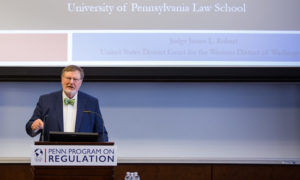Increasing EPA’s Scientific Transparency
Despite concerns, environmental agency’s “transparent science” proposed rule supports existing guidelines.
Science, Transparency, and Environmental Policy
Scholars and regulatory commentators debate the significance of EPA’s recently proposed “transparency” rule.
More Permissive Zoning Codes Could Make U.S. Workers Richer
Economists find that strict housing regulations may significantly lower U.S. gross domestic product.
Taking a Gamble on Casino Regulation
Scholar argues that rulemakers can “nudge” gamblers toward more rational behavior at casinos.
Regulating the Antibiotic Resistance Crisis
Scholar praises a California law that widely eliminates antibiotics use in the livestock industry.
Negative News for European Union Bank Failure Board
An audit report criticizes the Single Resolution Mechanism and proposes improvements for the EU banking union.
Department of Agriculture Withdraws Revisions to Organic Standards
USDA withdraws an Obama-era rule that would have set animal welfare standards for organic foods.
Is the Captive Audience Doctrine the Key to Regulating Harassment?
Scholar explores a new legal basis for regulating street and cyber-harassment.
Waiving Credit Freeze Fees
The Dodd-Frank rollback will prohibit credit bureaus from charging fees to freeze credit reports.
Laying Down the Law on Rule Delays
Recent judicial decisions help clarify the legality of rule freezes after a change in administration.
Executive Orders and the Limits of Presidential Authority
Federal judge discusses the Trump Administration’s original travel ban.
Doctors or Devices?
Scholar weighs the possibility of regulating medical artificial intelligence like human professionals.












